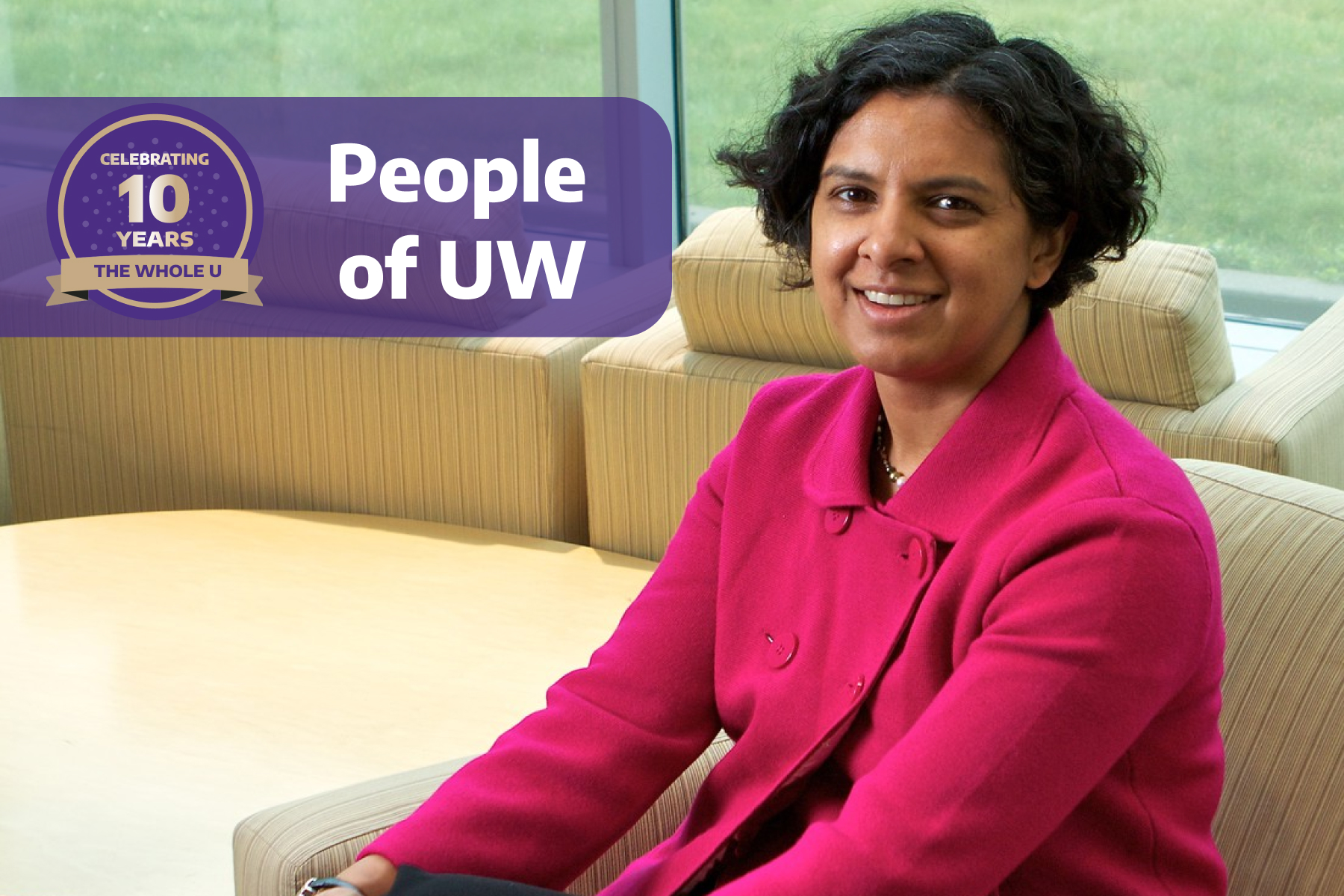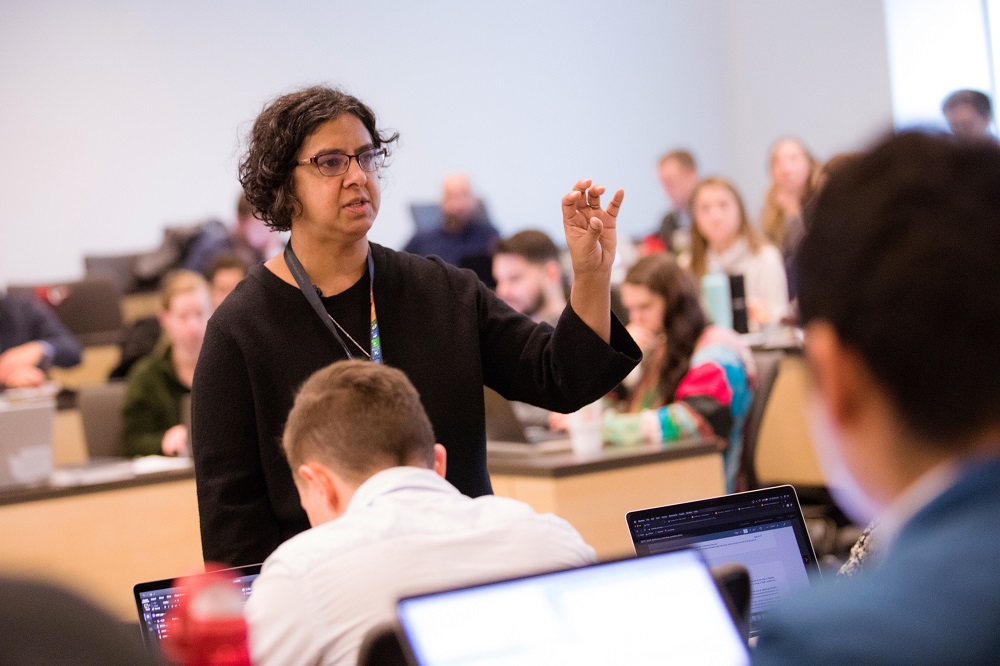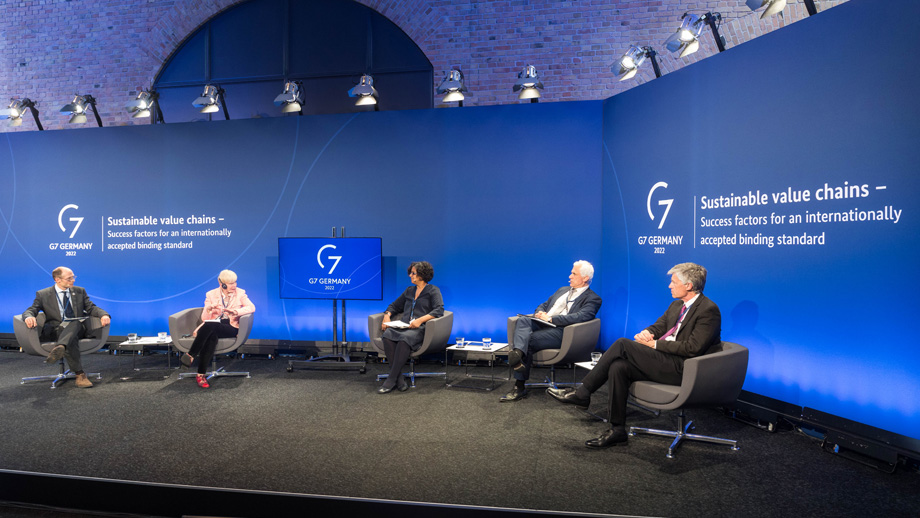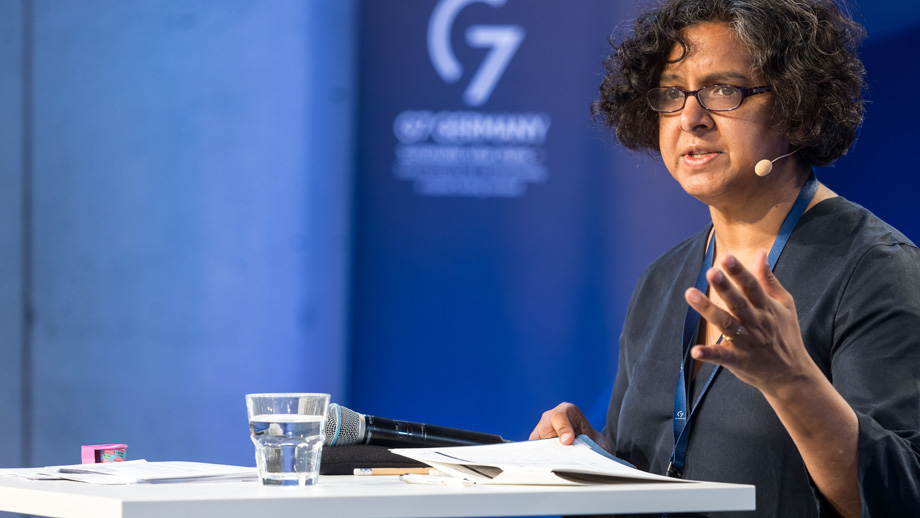
Anita Ramasastry applies law, policy and pragmatism to fight corruption and defend human rights around the world
The curriculum vitae of Anita Ramasastry is awe-inspiring. And a bit exhausting.
The Henry M. Jackson Professor of Law has compiled an impressive record of traditional academic activities and achievements, from directing the UW School of Law’s Sustainable International Development Graduate Program and serving as senior advisor to the UW’s Office of Global Affairs to receiving the UW Distinguished Teaching Award (1998) and Outstanding Public Service Award (2002).
Ramasastry’s prolific research on international commercial law, responsible business conduct, anti-corruption and economic development has given rise to the new field called “Business and Human Rights,” which calls on governments and corporations to protect human rights all the way down the global supply chain. She founded and co-edits the Business and Human Rights Journal and co-founded the Global Business and Human Rights Scholars Association.
 This scholarship, in turn, has earned repeated invitations to shape human rights policy through the United Nations, the Organization for Security and Cooperation in Europe, the Uniform Law Commission, the Institute for Human Rights and Business, Transparency International and Global Witness, among pages of organizations.
This scholarship, in turn, has earned repeated invitations to shape human rights policy through the United Nations, the Organization for Security and Cooperation in Europe, the Uniform Law Commission, the Institute for Human Rights and Business, Transparency International and Global Witness, among pages of organizations.
It’s a heavy lift on heavy topics. But Ramasastry does not take for granted her privileged position to apply theory to real-world policy, to interpret and advocate in order to affect real change.
“I’ve been very fortunate in my career to have the opportunities to work in policy and intergovernmental organizations,” she says. “I can marshal evidence quickly and make arguments based on this evidence to help policy makers—who are not going to read the academic articles—make good decisions. That’s my job.
“My other job, as someone who has worked against corruption and for human rights all my career, is to bring the voices of journalists and NGOs and human rights defenders into the room with policy makers to help craft solutions.”
International perspective
The foundations of Ramasastry’s global perspective go back to her parents, Indian emigres who came to the US for graduate studies. Her father, an engineer and rocket scientist, worked for NASA on its Apollo and Skylab programs before becoming involved in early international telecommunications negotiations. Her mother, a research scientist, worked for the American Red Cross.
“I teach my students that the law is never sufficient to change the world… Changing social norms is far more important.” – Anita Ramasastry
With both engaged in international research and policy making, it was no surprise that their daughter would inherit a global perspective and a profound sense of purpose.
Ramasastry studied history and literature at Harvard College, added a master’s at the University of Sydney, then returned to earn her JD from Harvard in 1992.
An early teaching position at the newly established Central European University exposed her to the fallout of the failed Soviet era. A formative role with the Federal Reserve Bank of New York opened her eyes to the primary source of society’s ills.
“I realized that corruption was one of the biggest problems facing modern society. The consequences were earth-shattering, and continue to be today,” Ramasastry says. “I found that many corrupt leaders around the world were also engaging in systematic human rights abuses. And businesses were somehow partners in this.
“I came to human rights through this journey.”
Getting involved
She also came to the University of Washington School of Law, in 1996. After one of her earliest academic papers—“Secrets and Lies? Swiss Banks and International Human Rights”—exposed the connections between banks and dictators and human rights violations, Ramasastry helped establish a claims tribunal to return Holocaust-era stolen assets that had been stashed in Swiss bank accounts.
It was the first of many forays beyond academia. Requests for her expertise began to roll in from around the world.
 Alongside her work at the UW, Ramasastry has advised the Stolen Asset Recovery Initiative of the World Bank Group and anti-corruption efforts of the U.S. Department of Commerce that were led by former Washington Governor Gary Locke during the Obama Administration. She has been an advisor to the European Bank for Reconstruction and Development on legal reform, led the Uniform Law Commission and recently chaired an effort to develop a uniform set of Corporate Crime Principles. She was a recent member of the World Economic Forum’s Global Future Council on Transparency and Anti-Corruption. And she spent six years as an expert appointed by the United Nations Human Rights Council, working with governments and companies to change their behavior with respect to corporate human rights abuses.
Alongside her work at the UW, Ramasastry has advised the Stolen Asset Recovery Initiative of the World Bank Group and anti-corruption efforts of the U.S. Department of Commerce that were led by former Washington Governor Gary Locke during the Obama Administration. She has been an advisor to the European Bank for Reconstruction and Development on legal reform, led the Uniform Law Commission and recently chaired an effort to develop a uniform set of Corporate Crime Principles. She was a recent member of the World Economic Forum’s Global Future Council on Transparency and Anti-Corruption. And she spent six years as an expert appointed by the United Nations Human Rights Council, working with governments and companies to change their behavior with respect to corporate human rights abuses.
Among many current advisory and leadership roles, Ramasastry is the special representative on combating corruption at the Organization for Security and Cooperation in Europe and, until recently, chair of the United Nations Working Group on Business and Human Rights, where her scholarship has helped shape implementation of the “Guiding Principles on Business and Human Rights.”
Business and Human Rights
This latest UN effort is a culmination of Ramasastry’s career. From a wide perspective, her research, education and advocacy has endeavored to connect the corrupt actions of governments and corporations with downstream human rights abuses.
This is not a new problem. “It’s not as if we woke up and suddenly there was child labor in supply chains,” she says. “Human right issues have plagued us forever.”
From the exploitative East India Company of the British Empire to the forced labor of Japanese mining companies in the early 1900s to the culpable German industrialists during World War II to the chemical disaster of Union Carbide in the 1980s. The difference today?
“What was previously made invisible is now visible,” Ramasastry says. “You have historians and journalists and other watchdogs exposing these issues. We are aware that corporations and consumers can be connected to harm halfway around the world. We have frameworks—like what I’ve worked on with the UN—that are attempting to address these issues. And those frameworks are slowly turning into legislation.”
Visibility is motivating
Ramasastry believes that the Business and Human Rights movement can help enlighten organizations in ways that existing efforts do not. She points out that Corporate Social Responsibility (CSR) is guided by company leadership and that Environmental, Social and Governance (ESG) is driven by investors. But her new framework is driven by stakeholders along the global supply chain.
 “Business and Human Rights,” she explains, “is more about thinking about what positive impacts companies can have by engaging with what we call ‘rights holders.’ The UN framework talks about due diligence and risk mitigation, principles that corporations are comfortable with.”
“Business and Human Rights,” she explains, “is more about thinking about what positive impacts companies can have by engaging with what we call ‘rights holders.’ The UN framework talks about due diligence and risk mitigation, principles that corporations are comfortable with.”
To further persuade them to respect and protect human rights, Ramasastry calls on arguments she learned from her time in the Commerce Department: greater competitiveness (the business case), commonality (connecting human rights to ethical behaviors they already endorse) and transparency (the world is watching).
“One of the most effective methods is to ask companies: is it better to address these issues than to have them brought to your attention by NGOs or lawsuits?” she says. “I think the larger message for many is that it’s harder to hide things today.”
Teaching and research in action
While keeping a crowded schedule of extracurricular activities, Ramasastry continues to produce impactful research and deliver award-winning education at the UW. She is proud to see former students rise to key positions within organizations like the UN and companies like Starbucks. “The best thing I can do is to teach well and help people move into these roles,” she says.
The Sustainable International Development master’s degree program that she directs draws students from around the world to contribute to major human rights projects.
“I teach my students that the law is never sufficient to change the world,” Ramasastry says. “Laws aren’t always implemented, enforced or followed. Changing social norms is far more important.”
For that, understanding history, politics, economics and sociology is also required.
Plus the fact that all corporations are global. And smart. And prone to look the other way when profit is in the balance.
“Corporations can figure out whether the gain is greater than the potential cost of committing bribery or violating sanctions,” she says. “We’re trying to get governments and companies to understand that corruption causes significant harm to people and communities.”
Ongoing concerns
In her decades of work, Ramasastry has seen some progress. The European Union is negotiating a new directive on human rights in supply chain. She has helped write uniform laws on human trafficking that have been adopted by many U.S. states. And she has seen an encouraging shift in demand for human rights protections from governments. “Companies are calling for international standards to level the playing field,” she says. “Getting to this point where companies become champions for regulation has been very rewarding.”
But the end of corruption is hardly near. While everyday hunger for profit continues to make cutting corners tempting, Ramasastry says that corruption rates spike during crises—such as pandemics, wars and climate disruptions—when governments are in a hurry to distribute resources and incentives.
Add to this the global trend to concentrate political power, and Ramasastry knows that her work is far from done. She remains motivated by the reality that the effects of corruption are worst felt by the most vulnerable.
Like the estimated 50 million people around the world who are trapped in debt bondage, forced labor and other forms of modern slavery.
Ramasastry’s response to this horrific figure? To join the newly formed Global Commission on Modern Slavery and Human Trafficking. And use her powers to do something about it.
“Some academics are comfortable being great teachers or researchers,” she says. “For me, the opportunity to use my voice for advocacy is critical for two reasons: To be a voice in the policy conversation channeling both empirical data and the perspectives of those who don’t usually get heard. And to convince people that these issues should matter to them—and they should pursue solutions.”
Want to learn more?
Here are a few good books and films that Anita Ramasastry recommends on the topics of modern slavery, human rights and global supply chains:
Modern Slavery: A Global Perspective by Siddarth Kara
Cobalt Red: How the Blood of the Congo Powers our Lives by Siddarth Kara
Thieves of State: Why Corruption Threatens Global Security by Sarah Chayes
The Laundromat: Inside the Panama Papers Investigation of Illicit Money and the Global Elite by Jake Bernstein (adapted for a Netflix film by Steven Soderbergh).
The Price of Free, a documentary film about Nobel Prize winner Kailash Satyarthi
